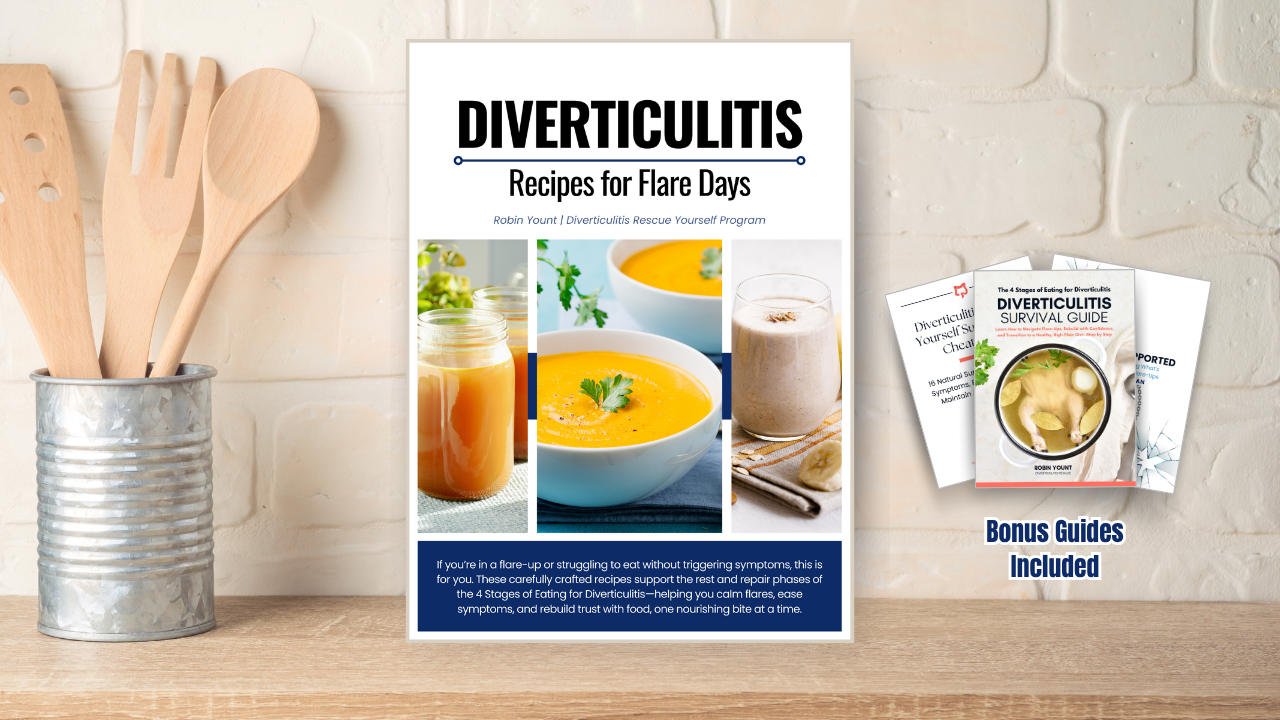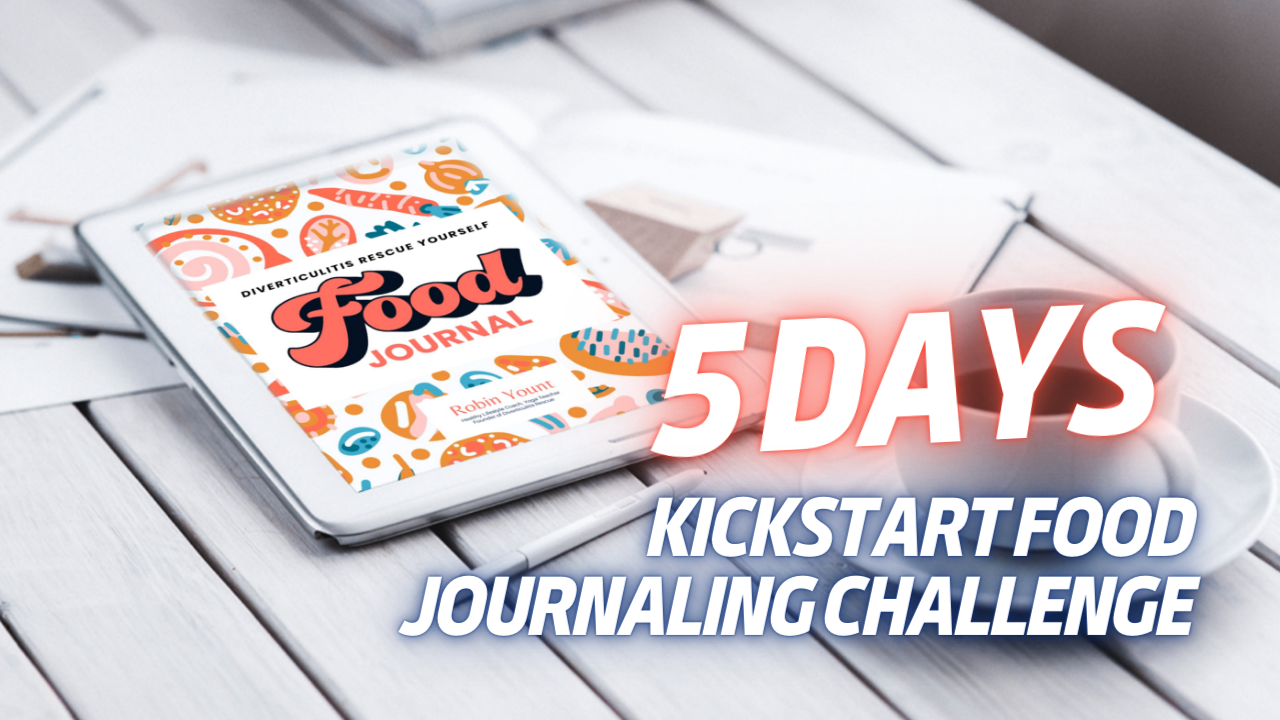Savoring a Gut-Friendly Thanksgiving: Embrace the Power of Sweet Potatoes
Nov 15, 2023
As Thanksgiving approaches and the air fills with a sense of gratitude and togetherness, it's the perfect time to embrace the nourishing power of sweet potatoes. These versatile tubers are not only delicious but also gut-friendly, making them an ideal addition to your Thanksgiving feast, especially if you have diverticulitis.
Imagine yourself seated at a table adorned with autumnal decorations, surrounded by loved ones eagerly awaiting the Thanksgiving meal. As someone with diverticulitis, you may have concerns about enjoying the holiday without triggering uncomfortable symptoms. However, with the inclusion of sweet potatoes in your Thanksgiving spread, you can create a dish that not only satisfies your taste buds but also supports your gut health.
Sweet potatoes are a true gift from nature, packed with nutrients that can help soothe inflammation, nourish beneficial gut bacteria, and promote intestinal health. Their vibrant colors and delightful flavors make them a perfect addition to your Thanksgiving feast. Whether you prefer them roasted, mashed, or incorporated into soups and stews, sweet potatoes offer a range of culinary possibilities that will leave you feeling satisfied and nourished.
In this blog post, we'll explore the many benefits of sweet potatoes for those with diverticulitis. We'll provide you with mouthwatering recipes and creative ideas to incorporate these gut-friendly tubers into your Thanksgiving menu. From savory side dishes to hearty main courses, you'll discover how sweet potatoes can take center stage on your plate, enhancing both the flavor and nutritional value of your holiday meal.
So, let's embark on this journey together, as we unlock the secrets of a gut-friendly Thanksgiving with the help of sweet potatoes. Get ready to savor every bite, knowing that you're nourishing your body and embracing the joy of the holiday season, all while managing your diverticulitis with grace and deliciousness.
Understanding Diverticulitis: Causes, Impact, and Holistic Management
Diverticulitis is a common digestive condition that affects millions of people worldwide. While it was once thought to primarily strike older individuals or those prone to constipation, there is now a growing understanding that diverticulitis can affect people of all ages, including younger individuals. This condition occurs when small pouches, called diverticula, form in the lining of the colon and become inflamed or infected. The exact cause of diverticulitis is still not fully understood, but lifestyle factors such as diet, exercise, mindfulness, and stress management play a significant role in managing the disease. It is now recognized that stress can impact the gut and contribute to conditions like diverticulitis. By incorporating a healthy lifestyle that encompasses the 4 Stages of Eating for Diverticulitis, regular exercise, mindfulness practices, and effective stress management techniques, individuals can actively manage their diverticulitis symptoms and enhance their overall gut health.
At Diverticulitis Rescue, we are dedicated to supporting individuals in managing diverticulitis through a holistic and natural approach that addresses the root causes of the condition. We understand the vital connection between the mind and body, and how it influences gut health. By focusing on comprehensive lifestyle changes, including mindful eating, regular exercise, stress management, and incorporating gut-friendly foods into the diet, such as sweet potatoes, we empower individuals to achieve long-term symptom management and promote overall gut health. Sweet potatoes, in particular, are a delicious and nutritious addition to a gut-friendly diet. They offer a multitude of benefits for gut health, thanks to their anti-inflammatory properties and rich content of prebiotic fiber. These properties help to calm inflammation, nourish the gut lining, and support a healthy balance of gut bacteria. By incorporating sweet potatoes and other nutritious plant foods into your diet, you can take proactive steps towards improving your symptoms, optimizing your digestive health, and experiencing long-lasting relief from diverticulitis.
What Makes Sweet Potatoes a Gut-Friendly Food?
Sweet potatoes are an excellent choice for promoting gut health due to their numerous beneficial properties. They are a rich source of essential nutrients such as vitamin A, vitamin C, manganese, and fiber. In fact, just one medium baked sweet potato can provide over 100% of your daily vitamin A needs. One of the key reasons sweet potatoes are considered gut-friendly is their high fiber content. They contain both pectin and resistant starch, which act as prebiotics. These fibers serve as nourishment for the healthy gut bacteria in our digestive system, promoting their growth and overall gut health. Moreover, sweet potatoes may help improve gut barrier function and enhance nutrient absorption. This can be especially important for individuals with diverticulitis, as it can support the healing and restoration of the intestinal lining.
Additionally, sweet potatoes contain disease-fighting antioxidants like beta-carotene and anthocyanins. These compounds have been shown to reduce inflammation and oxidative stress in the body, which can be particularly beneficial for individuals with diverticulitis. The anti-inflammatory effects of sweet potatoes can help calm intestinal inflammation, providing relief for individuals experiencing symptoms related to diverticulitis.
Lastly, sweet potatoes are a versatile ingredient that can be easily incorporated into the 4 Stages of Eating for Diverticulitis. They can be baked, roasted, mashed, or used in soups and curries, making them a convenient and delicious addition to a gut-friendly diet. By including sweet potatoes in your diet, you can harness their gut-friendly properties to support your overall gut health and potentially alleviate symptoms associated with diverticulitis.
Striking the Right Balance: FODMAPs and Sweet Potatoes in Diverticulitis Management
When it comes to incorporating gut-friendly foods into your diet, sweet potatoes are often a top choice. However, it's important to consider the FODMAP content of sweet potatoes. FODMAPs are a group of carbohydrates that can be difficult to digest for some individuals, potentially leading to digestive symptoms like bloating, gas, and abdominal pain.
When it comes to sweet potatoes, they are considered low FODMAP when consumed in amounts of 1/2 cup or less. This means that smaller portions of sweet potatoes can be enjoyed without triggering FODMAP-related symptoms. However, it's crucial to note that larger servings of sweet potatoes can be high in FODMAPs, particularly the oligosaccharide fructans, which may worsen symptoms in individuals with diverticulitis.
By being mindful of the FODMAP content and consuming sweet potatoes in appropriate portions, individuals with diverticulitis can still benefit from the gut-friendly nature of sweet potatoes while minimizing the risk of triggering symptoms associated with high FODMAP foods.
What the Science Says About Sweet Potatoes
-
Resistant starch content: Sweet potatoes contain resistant starch, a type of starch that resists digestion in the small intestine and reaches the colon intact. In the colon, resistant starch acts as a prebiotic, feeding beneficial gut bacteria and promoting their growth. This can help improve gut health and potentially alleviate symptoms associated with diverticulitis.
-
Gut barrier function: The gut lining plays a crucial role in maintaining gut health, and disruptions in gut barrier function can contribute to digestive issues. Sweet potatoes are rich in nutrients like vitamin A, which is important for maintaining the integrity of the intestinal lining.
- Good source of fiber: Sweet potatoes are a good source of dietary fiber, with one medium-sized sweet potato providing about 4 grams of fiber. Fiber is essential for maintaining a healthy digestive system and promoting regular bowel movements.
- Promote healthy digestion: The fiber content in sweet potatoes can help prevent constipation and promote healthy digestion by adding bulk to the stool and supporting regular bowel movements.
- Support gut microbiome diversity: The fiber and resistant starch in sweet potatoes can help increase the diversity of the gut microbiome, which is associated with better overall gut health.
- Reduce inflammation: Sweet potatoes contain antioxidants and anti-inflammatory compounds that can help reduce inflammation in the gut. Chronic inflammation in the gut can contribute to digestive disorders and other health issues.
- Improve nutrient absorption: The fiber in sweet potatoes can help improve nutrient absorption by slowing down the digestion process and allowing more time for nutrients to be absorbed in the small intestine.
- Regulate blood sugar levels: Sweet potatoes have a lower glycemic index compared to regular potatoes, meaning they cause a slower and more gradual rise in blood sugar levels. This can help regulate blood sugar levels and prevent spikes and crashes that can negatively impact gut health.
Tips for Adding Sweet Potatoes in Stages 2 and 3
By incorporating sweet potatoes into your diet while following the 4 Stages of Diverticulitis, you can nourish your gut and take control of your well-being. Sweet potatoes are packed with fiber, vitamins, and minerals, supporting healthy digestion and overall gut function. They offer a delicious and versatile way to add variety to your meals, whether you're in the early stages of diverticulitis or focusing on long-term gut health maintenance.
With their naturally sweet and earthy flavor, sweet potatoes provide a delightful balance of sweetness and savory notes. Their taste can vary slightly depending on the variety, making them a versatile ingredient for both sweet and savory dishes. Pair them with a wide range of seasonings and cooking techniques to create delicious meals that satisfy your taste buds.
Stage 2: Sweet Potato Blended Soup or Mash
In Stage 2 of the 4 Stages of Eating for Diverticulitis, you can enjoy the comforting goodness of sweet potato blended soup or mash. These preparations provide a smooth and easy-to-digest option, perfect for soothing your gut while still enjoying the benefits of sweet potatoes.
Blending the soup helps to create a smooth and easily digestible texture. You can start by cooking peeled and cubed sweet potatoes in bone broth or water until they are soft. Then, using an immersion blender or a regular blender, blend the cooked sweet potatoes until smooth and creamy. You can season the soup with salt and pepper to taste. This simple sweet potato soup provides the benefits of sweet potatoes in a gentle and easy-to-digest form.
Another option for Stage 2 is to make a simple sweet potato mash. To do this, cook peeled and cubed sweet potatoes until they are soft. Then, mash them using a potato masher or fork until they reach a smooth and creamy consistency. You can add a small amount of bone broth or ghee to enhance the flavor and texture. Season the mash with salt and pepper to taste. This easy-to-digest sweet potato mash provides a soft and comforting option for Stage 2.
The key during Stage 2 is to focus on foods that are soft, easily mashed or blended, and gentle on the gut. You can experiment with different variations by adding herbs, spices, or even incorporating other easily digestible vegetables like carrots or zucchini. Remember to listen to your body and make adjustments as needed.
To get you started, we are sharing a simple, gut-soothing recipe for Sweet Potato Soup. It's easy to digest and provides the anti-inflammatory benefits of sweet potatoes in a creamy, comforting soup. Please see recipe below.
Stage 3: Cooked, Roasted, or Sautéed Sweet Potatoes
As you progress to Stage 3, you have the opportunity to explore a variety of cooking methods for sweet potatoes. Cooking, roasting, or sautéing them unlocks even more flavors and textures, adding depth and richness to your meals.
In addition to the delicious taste, taking a holistic approach to your diet and incorporating cooked, roasted, and sautéed foods can provide additional benefits for your gut health and support the healing process. When foods are cooked, the heat breaks down the fibers and complex carbohydrates, making them easier for the gut to process. This can reduce the strain on the digestive system and promote better nutrient absorption.
Here are some gut-friendly recipe inspirations for cooking, roasting, and sautéing sweet potatoes:
1. Roasted Sweet Potato Wedges: Cut sweet potatoes into wedges, toss them with a little olive oil, salt, and your favorite herbs or spices. Roast them in the oven until they are tender and slightly caramelized. This method enhances the natural sweetness of the sweet potatoes and creates a delicious side dish.
2. Baked Sweet Potato Fries: Cut sweet potatoes into thin strips, toss them with a little olive oil, salt, and spices like paprika or garlic powder. Bake them in the oven until they are crispy on the outside and tender on the inside. This healthier alternative to traditional fries can be enjoyed as a snack or a side dish.
3. Sautéed Sweet Potato Hash: Dice sweet potatoes into small cubes and sauté them in a skillet with a little olive oil or ghee. Add in some diced onions and your choice of protein like cooked chicken or turkey. Season with herbs and spices of your choice. This dish can be a satisfying and flavorful option for breakfast or a hearty meal.
By incorporating cooked, roasted, and sautéed sweet potatoes into your diet, you are providing your body with nourishing and easily digestible options. This can help reduce inflammation, support gut healing, and improve overall digestive function. Enjoy the versatility and benefits of sweet potatoes in Stage 3 of your journey to better gut health.
Remember to follow the 4 Stages of Eating for Diverticulitis to ensure you're following the appropriate stage for your current needs. For more information and guidance on the stages, visit diverticulitisrescue.com.
Instructions:
- In a large pot, heat the olive oil over medium heat. Add the onion and sauté for 5 minutes until translucent.
- Add the carrots and sweet potatoes. Sauté for 4-5 more minutes.
- Pour in the broth and spices. Bring to a boil.
- Reduce heat and simmer for 15-20 minutes until veggies are tender.
- Use an immersion blender to puree the soup until smooth and creamy. (Or blend in batches in a countertop blender).
- Season with salt and pepper.
This simple, Stage 2 puréed vegetable soup provides vitamin A, fiber, potassium and anti-inflammatory benefits from the sweet potatoes. It's easy on the digestive system and gut-soothing. This soup is perfect for those stepping into Stage 2 after a flare, those needing to pull back to an earlier stage, or even those comfortably flowing through all the stages. The liquid base allows the gut to rest and heal. Try this recipe as you transition back to a normal diet after a flare. To build on this soup as you progress in Stage 2, consider adding well-cooked rice congee to provide easily digestible carbohydrates and calories. Listen to your body and adjust ingredients as needed.
Conclusion:
As Thanksgiving approaches, why not embrace the spirit of gratitude and celebrate the goodness of sweet potatoes? Whether you choose to serve them as a creamy mashed side dish or as perfectly roasted wedges, sweet potatoes can add a touch of warmth and nourishment to your holiday feast.
So, as you gather around the table with loved ones, take a moment to appreciate the versatility and health benefits that sweet potatoes bring to your journey towards better gut health. Let their vibrant colors and rich flavors remind you of the abundance of nature's gifts and the power of nourishing your body from within.
From all of us at Diverticulitis Rescue, we wish you a happy and healthy Thanksgiving filled with love, laughter, and delicious sweet potatoes. Cheers to your well-being and the joy of embracing a gut-friendly lifestyle!

If you're interested in exploring more ways to manage your diverticulitis in a natural and holistic way, we encourage you to visit www.diverticulitisrescue.com. There, you'll find a wealth of valuable information and resources to guide you on your journey. From educational articles to recipe ideas, you'll have access to the tools you need to make informed choices and create a diet that supports your gut health. Additionally, the website provides a supportive community where you can connect with others who are managing the disease. Sharing experiences, tips, and encouragement can make a significant difference in your journey to a healthier gut.
At Diverticulitis Rescue, we are committed to helping individuals find their balance and way forward. We understand that managing diverticulitis can be challenging, but you don't have to do it alone. We are dedicated to providing you with the knowledge, support, and resources you need to navigate the path to optimal gut health. Together, we can help you find your way to a healthier gut and a more vibrant life.
We hope the information and guidance provided in this blog post have been helpful to you. If you have any further questions or need additional assistance, please don't hesitate to reach out. Wishing you all the best on your journey to optimal gut health!
Stay Connected with My Newsletter
YOUR SOURCE FOR DIVERTICULITIS SUPPORT & INSPIRATION
Dive into our newsletter. Each edition delivers personal stories, natural strategies, and practical tips to help you find balance, relief, and strength on your journey.
Sign up with your email to stay connected and gain exclusive diverticulitis insights to support your gut health and a flare-free life.
We hate SPAM. We will never sell your information, for any reason.











